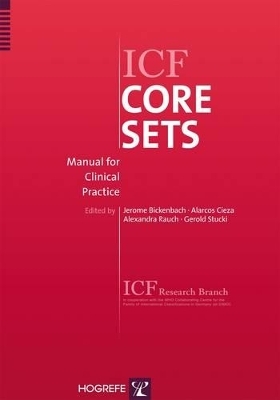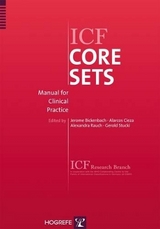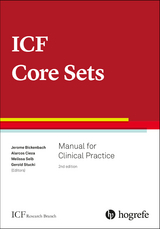ICF Core Sets
- Titel ist leider vergriffen;
keine Neuauflage - Artikel merken
This title covers such subject areas as: Medicine; Health Sciences; Nursing; Rehabilitation Medicine; Classification of Disorders; and, Health and Medical Psychology. It is suitable for practitioners and students of physical and rehabilitation medicine, physical therapy, occupational medicine, physiotherapy, as well as prosthetics/orthotics, and health and medical psychology, and for the ICF Research Branch, in cooperation with the WHO Collaborating Centre for the Family of International Classifications in Germany (at DIMDI). It provides practical, standardized tools to assess and document functioning, disability, and health according to the WHO ICF in a variety of health conditions and settings. The WHO's International Classification of Functioning, Disability and Health (ICF) is the accepted common framework for understanding and documenting functioning and disability. The ICF Core Sets selected for this book have now been developed to facilitate the standardized use of the ICF in real-life clinical practice and thus improve quality of care.
By using this collection of clear checklists, definitions, and forms, clinicians will quickly and easily be able to assess clients with a range of typical health conditions at different stages and in a variety of health care contexts. This manual introduces the concepts of functioning and disability. It describes how and why the ICF Core Sets have been developed. It shows, step-by-step, how to apply the ICF Core Sets in clinical practice. It includes all 31 ICF Core Sets plus documentation forms (more than 1,400 pages of printable PDFs) on a CD-ROM. This manual is inherently multi-professional and will be of benefit not only for practitioners working in various health care contexts but also for students and teachers.
Jerome Bickenbach, PhD, LLB, is a member of the steering committee of the ICF Research Branch, was closely involved in the development of the ICF at the WHO, and is a member of the Functioning and Disability Reference Group (FDRG) at WHO. Alarcos Cieza, Psychologist, PhD, MPH, is a member of the steering committee of the ICF Research Branch. She has led the development process of several ICF Core Sets since 2001. She also led the development of the ICF e-Learning tool at WHO and participated in the development of other training materials and of the ICF Core Set documentation tools. She is a member of the Functioning and Disability Reference Group (FDRG) of WHO. Alexandra Rauch, PT, BSc, MPH, participated in the development and validation of several ICF Core Sets, ICF Core Set documentation tools, and various ICF training materials, as well as being Leader of ICF training workshops. Gerold Stucki, MD, MS, is Professor and Chair of the Department of Health Sciences and Health Policy at the University of Lucerne, Director of Swiss Paraplegic Research (SPF), and Director of the ICF Research Branch. As Co-Chair of the Functioning and Disability Reference Group (FDRG) of the WHO Family of International Classifications (WHO-FIC) Network, and President of the International Society of Physical and Rehabilitation Medicine (ISPRM), he is promoting the implementation of the ICF in medicine, rehabilitation, and the health sector at large. Towards this end he initiated the ICF Core Set project and has guided its development as a member of the steering committee.
1. Preface Gerold Stucki; 2. What is Functioning and why is it important? Jerome Bickenbach; 3. Introduction to the ICF Alexandra Rauch, Miriam Luckenkemper, Alarcos Cieza; 3.1. The integrative model of functioning, disability and health; 3.2. The structure and codes of the ICF classification; 3.3. ICF qualifiers; 4. ICF Core Sets Pavel Ptyushkin, Melissa Selb, Alarcos Cieza; 4.1. ICF Core Set development process; 4.2. Available ICF Core Sets; 4.3. Types of ICF Core Sets; 5. Use of ICF Core Sets in practice Alexandra Rauch, Miriam Luckenkemper, Alarcos Cieza; 5.1. The selection of ICF Core Sets ("What to describe"); 5.2. The description of the level of functioning ("How to describe"); 5.3. The documentation form; 6. Case Examples; 6.1. Use of the ICF Core Set for musculoskeletal conditions in the acute context Alexandra Rauch; 6.2. Use of the ICF Core Set for spinal cord injury in the early post-acute context Alexandra Rauch; 6.3. Use of the ICF Core Set for multiple sclerosis in the long-term context Andrea Glassel, Miriam Luckenkemper; 6.4. Use of the ICF Core Set for vocational rehabilitation Monika Finger, Miriam Luckenkemper; 6.5. Use of the ICF Core Set for low back pain in the long-term context Todd Davenport, Sean D. Rundell, Reuben Escorpizo; 7. References; 8. Acknowledgements; 9. Key terms; Contents of the CD; Ca. 1,400 printable pages, with both a brief version and a comprehensive version (except in the case examples) of the following:; 1. ICF Core sets; a) Acute Context; Acute Inflammatory Arthritis; Cardiopulmonary Conditions; Musculoskeletal Conditions; Neurological Conditions; b) Early Post-Acute Context; Cardiopulmonary Conditions; Geriatric Patients; Musculoskeletal Conditions; Neurological Conditions; Spinal Cord Injury; c) Long-Term Context; Ankylosing Spondylitis; Bipolar Disorders; Breast Cancer; Chronic Ischaemic Heart Disease; Chronic Widespread Pain; Depression; Diabetes Mellitus; Hand Conditions; Head And Neck Cancer; Inflammatory Bowel Diseases; Low Back Pain; Multiple Sclerosis; Obesity; Obstructive Pulmonary Diseases; Osteoarthritis; Osteoporosis; Rheumatoid Arthritis; Sleep; Spinal Cord Injury; Stroke; Traumatic Brain Injury; Vocational Rehabilitation; 2. ICF Documentation Forms for the Acute Context; Acute Inflammatory Arthritis; Cardiopulmonary Conditions; Musculoskeletal Conditions; Neurological Conditions; 3. ICF Documentation Forms for the Early Post-Acute Context; Cardiopulmonary Conditions; Geriatric Patients; Musculoskeletal Conditions; Neurological Conditions; Spinal Cord Injury; 4. ICF Documentation Forms for the Long-Term context; Ankylosing Spondylitis; Bipolar Disorders; Breast Cancer; Chronic Ischaemic Heart Disease; Chronic Widespread Pain; Depression; Diabetes Mellitus; Hand Conditions; Head And Neck Cancer; Inflammatory Bowel Diseases; Low Back Pain; Multiple Sclerosis; Obesity; Obstructive Pulmonary Diseases; Osteoarthritis; Osteoporosis; Rheumatoid Arthritis; Sleep; Spinal Cord Injury; Stroke; Traumatic Brain Injury; Vocational Rehabilitation; 5. Case Examples for: Musculoskeletal Conditions in the Acute Hospital; Spinal Cord Injury in the Early Post-Acute Context; A Patient with Multiple Sclerosis in the Long-Term Context; Vocational Rehabilitation In The Long-Term Context; Patient With Low Back Pain In The Long-Term Context.
| Zusatzinfo | Illustrations |
|---|---|
| Verlagsort | Toronto |
| Sprache | englisch |
| Maße | 178 x 254 mm |
| Einbandart | gebunden |
| Themenwelt | Geisteswissenschaften ► Psychologie ► Sozialpsychologie |
| Medizin / Pharmazie ► Allgemeines / Lexika | |
| Medizin / Pharmazie ► Pflege | |
| Schlagworte | DIMDI • ICF Core Sets • International Classification of Functioning, Disability and Health • WHO |
| ISBN-10 | 0-88937-431-7 / 0889374317 |
| ISBN-13 | 978-0-88937-431-7 / 9780889374317 |
| Zustand | Neuware |
| Informationen gemäß Produktsicherheitsverordnung (GPSR) | |
| Haben Sie eine Frage zum Produkt? |
aus dem Bereich



